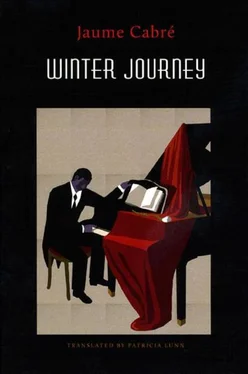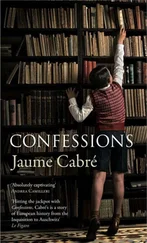Jaume Cabré
Winter Journey
The Roderleins, because the performer was their professor, held out, though they were in agony, until the twelfth variation. The individual wearing the two vests fled at the fifteenth.
E.TA. Hoffmann


 e adjusted the seat because it was a little low. Though half an hour ago he'd left it just right. No, now it's too high. And it's a little wobbly, see? Damn. Now. No. Yes. He took the handkerchief out of the pocket of his tailcoat and dried the palms of his hands. While he was at it he passed the handkerchief over the spotless keys, as if they were wet from the sweat of other disconcerts. He adjusted his cuffs. Every part of me hurts. My throat is dry, my blood prickles and my heart is about to explode for all kinds of reasons. 1 don't want my hands to shake. To his right, the mortal chill of the audience. He didn't want to look again in case he really hadn't been disoriented when he sneaked a peek at the first rows while taking a bow. Of course he had. Otherwise, he should stop right now. A woman coughed. A man coughed, far away and hard, which reminded him how huge the hall was. It's nothing, to my right there's nothing going on, nothing. Just ice, the enemy, death. The seat, back, just a little.
e adjusted the seat because it was a little low. Though half an hour ago he'd left it just right. No, now it's too high. And it's a little wobbly, see? Damn. Now. No. Yes. He took the handkerchief out of the pocket of his tailcoat and dried the palms of his hands. While he was at it he passed the handkerchief over the spotless keys, as if they were wet from the sweat of other disconcerts. He adjusted his cuffs. Every part of me hurts. My throat is dry, my blood prickles and my heart is about to explode for all kinds of reasons. 1 don't want my hands to shake. To his right, the mortal chill of the audience. He didn't want to look again in case he really hadn't been disoriented when he sneaked a peek at the first rows while taking a bow. Of course he had. Otherwise, he should stop right now. A woman coughed. A man coughed, far away and hard, which reminded him how huge the hall was. It's nothing, to my right there's nothing going on, nothing. Just ice, the enemy, death. The seat, back, just a little.
High up in the back balcony, hours away from the stage, a woman with honey-and-amber eyes was suffering, hidden by the shadow of the hall, because Pere Bros had been wiping the fear from his hands for four minutes, and the crowd that filled the Auditori and silently watched all of his movements was starting to get nervous.
Pere Bros adjusted his cuffs for the second time. To his right, he felt the absurd and suicidal attraction of nothing, but he resisted it. Then, two fat drops of sweat slid down his forehead and suddenly clouded his vision, and the honey-and-amber eyes in the balcony filled with tears for poor Pere. They don't realize he's suffering, they don't realize this is torture for him. Bros had to take his handkerchief out again and wipe his eyes. Then, with an infinite effort, he covered his face with his hands, conjured up the absurd vision he'd had while taking his bow, and could think only of death. He took a couple of breaths and began with the first mysterious chords of the 960, and a wave of panic passed through the audience. What's he doing, why is he beginning with the last one? The program says… The guy's nuts, why is he doing the program backwards? And the amber eyes listened attentively to the intimate meditation on death, one of life's most thrilling sonatas, with words by Wesselenyi that she didn't know, an intimate meditation on death, written by a man who did his crying in B-flat major.
Forty-two minutes and thirteen seconds later, no one in the Auditori was asking why he'd begun at the end. Rather, they were keeping their souls open, waiting, waiting. When the last note had faded away and Pere Bros was holding his hands outstretched above the keyboard, like a demiurge demonstrating his miraculous powers, he achieved ten, fifteen long seconds of silence, for the first and last time in his career. Then he relaxed his posture, lowered his hands, exhausted, and the audience began to applaud. Pere Bros got up, glanced towards the chill on his right, and yes, he saw him again, in the front row, wearing those stylish little spectacles, with his broad forehead and curly hair, dressed inappropriately, in seat number seven, in the silence of the dead and looking right at him, watching from the infinite how people were applauding enthusiastically and no doubt accusing him of not having been up to it. Cold sweat. Pere Bros left the stage to the sounds of public approbation. While he was returning to center stage and bowing his head to acknowledge the applause, it occurred to him that Schubert in the flesh looked just like the portrait on the first page of Voyage d'hiver, the detailed and unreliable biography published by Gaston Laforgue at the beginning of the twentieth century. As he made the required exit, he thought of Laforgue's argument that the three 1828 sonatas, the so-called posthumous ones, were written in a frenzy of vanity when Schubert learned that Beethoven had just died and the way was now open before him. His hands sweating, as if he were at the keyboard, he went out again and the applause got louder. I can't play anymore. 1 want Schubert to go away. They should get him out of the Auditori. 1 can't play in front of him, for God's sake. And he bowed. Then he thought of that day at the Graben in Vienna, with a cup of very hot chocolate in front of him, when dear Zoltan Wesselenyi said, What frenzy, Peter? Schubert left sketches, drafts, doubts, corrections and many questions about the three sonatas: that's no frenzy. (Wesselenyi had scalded his tongue because the chocolate was still steaming. My Zoltan, always so dreamy, so sad.) Schubert knew what he was doing, Peter, and he knew he was meditating on his own death. Especially in the D.96o.
"Fabulous, my boy. But you're a son of a bitch," spit Pardo as he pushed him onto the stage for another bow.
When he came back the audience was still applauding, but he made a motion to the stage manager to shut the door, he wasn't going back out.
"1 don't want to play any more matinees."
"We only have the one on December thirteenth. And it's sold out. What are you complaining about?"
"I'm going to my dressing room," he said, as if this were the complaint.
"You have visitors. Madame Grossman."
"1 don't want to see anybody."
"Madame Grossman."
"Nobody."
"And why the hell did you change the order of the program?"
"When the concert is over 1 want a taxi at the door."
"No way. After the concert you have Madame Grossman and an interview."
"No, 1 have a taxi."
"Like 1 said, you're a son of a bitch."
The andante sostenuto of the 96o is death from out of the fog of the Danube, at first far away and then terribly close, and Pere Bros achieved just one moment of tension during the three minutes of exposition, in a very gradual crescendo, impossible to maintain for anyone without hands of gold and fingers tipped with diamonds. And when the theme was repeated, the silence he achieved was so intense that he could hear the wood on the walls of the hall breathing. For that reason, and only for that reason, he did nothing but smile at Pardo and head for his dressing room, followed by his offended agent. He shut the door in his face. Me, without me he has no voice, no memory, no schedule!
Pere Bros poured himself a glass of Veuve Ambal as if this were just one more recital, no problem. But he couldn't keep from weeping. He went over to the upright piano and passed his hands lovingly over the keyboard. He took another sip, sat down at the instrument and raised the lid, utterly dejected. Then he saw the package that had arrived just before he went on stage. Urgent, airmail, from Vienna. He ripped it open. Beautiful, the way the book had turned out. On the cover, the Franciscan church in Vienna where Fischer had played the organ for thirty-three years. And a dedication from Zoltan: "To Pere Bros, who gave me the greatest joy of my life by telling me that he still considered exemplary, twenty-five years later, my version of the D.96o. From someone who was not brave enough to pursue the inhuman career of solo performance. May the beloved figure of Schubert and the gigantic figure of Fischer protect us. Your friend, Zoltan Wesselenyi."
Читать дальше



 e adjusted the seat because it was a little low. Though half an hour ago he'd left it just right. No, now it's too high. And it's a little wobbly, see? Damn. Now. No. Yes. He took the handkerchief out of the pocket of his tailcoat and dried the palms of his hands. While he was at it he passed the handkerchief over the spotless keys, as if they were wet from the sweat of other disconcerts. He adjusted his cuffs. Every part of me hurts. My throat is dry, my blood prickles and my heart is about to explode for all kinds of reasons. 1 don't want my hands to shake. To his right, the mortal chill of the audience. He didn't want to look again in case he really hadn't been disoriented when he sneaked a peek at the first rows while taking a bow. Of course he had. Otherwise, he should stop right now. A woman coughed. A man coughed, far away and hard, which reminded him how huge the hall was. It's nothing, to my right there's nothing going on, nothing. Just ice, the enemy, death. The seat, back, just a little.
e adjusted the seat because it was a little low. Though half an hour ago he'd left it just right. No, now it's too high. And it's a little wobbly, see? Damn. Now. No. Yes. He took the handkerchief out of the pocket of his tailcoat and dried the palms of his hands. While he was at it he passed the handkerchief over the spotless keys, as if they were wet from the sweat of other disconcerts. He adjusted his cuffs. Every part of me hurts. My throat is dry, my blood prickles and my heart is about to explode for all kinds of reasons. 1 don't want my hands to shake. To his right, the mortal chill of the audience. He didn't want to look again in case he really hadn't been disoriented when he sneaked a peek at the first rows while taking a bow. Of course he had. Otherwise, he should stop right now. A woman coughed. A man coughed, far away and hard, which reminded him how huge the hall was. It's nothing, to my right there's nothing going on, nothing. Just ice, the enemy, death. The seat, back, just a little.










